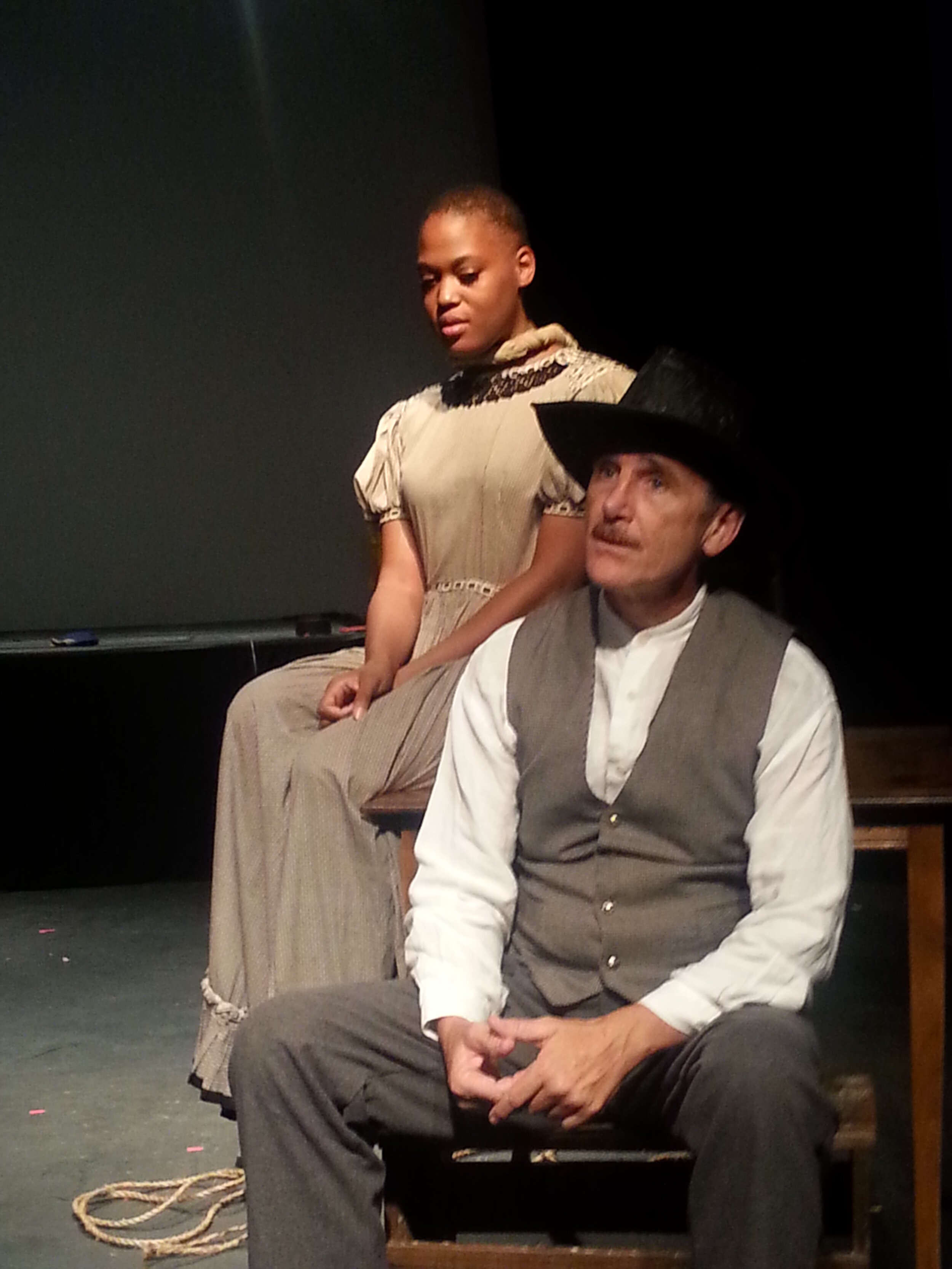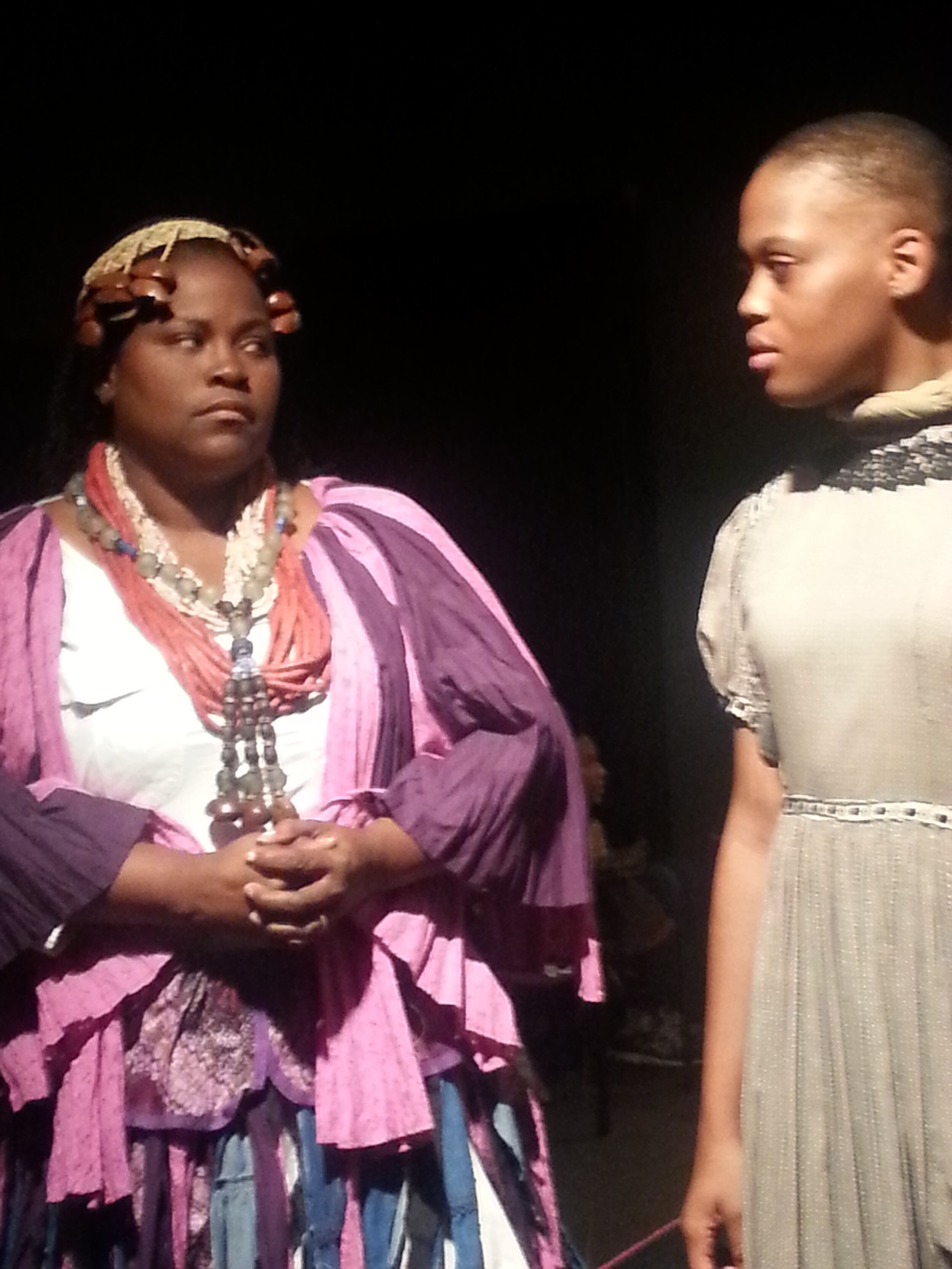the ballad of jane elkins
THE BALLAD OF JANE ELKINS is a historical drama that tells the true story of the first legal hanging in Dallas, Texas. Jane Elkins was a slave girl that was tried and hung for killing Mr. Wisdom, a widowed man from Farmers Branch, in 1853.
The play was first produced for Soul Rep Theatre Company's 8th New Play Festival in July 2014 and was directed by vickie washington. Teatro Dallas featured THE BALLAD OF JANE ELKINS in its Festival of Death in October 2014. Artistic Director, Cora Cardona served as the director.
articles and REVIEWS
DALLAS (CBSDFW.COM) – There’s the history of Dallas everyone knows.
Then, there are stories, like Jane Elkins’, largely forgotten and nearly erased by time.
Playwright Anyika McMillan-Herod first heard the tale from her grandmother and brought it to the stage.
“Because the play opens with her hanging, it’s a shocker,” said McMillan-Herod. “Folks were in tears. People had questions.”
Jane was a slave accused of killing Andrew Wisdom, a widower in northwest Dallas County who’d leased her to care for his children.
On May 27 1853, she became the first woman legally hanged in Texas.
McMillan-Herod’s “The Ballad of Jane Elkins” shows her convicted of murdering Wisdom with an axe.
Actress playing Jane Elkins (credit: Soul Rep Theatre)
“Her spirit was broken long before they broke my neck. That’s the first line of the play,” said McMillan Herrod.
The short play explores the theory Jane, like many enslaved women, was a victim of rape.
“Not having control of anything – your life, your mind, your children, your body,” said McMillan-Herod. “It was a reality and it has to be explored.”
But, not everyone accepts Jane was guilty.
“I feel that she was falsely accused,” said George Keaton, founder of Remembering Black Dallas, a nonprofit dedicated to memorializing victims of racial violence.
Actors playing Jane Elkins and Andrew Wisdom (credit: Soul Rep Theatre)
It is remarkable Jane received a trial; it is unlikely, Keaton believes, it was a fair one.
“She was an enslaved person. She did not have any rights,” said Keaton.
According to a Galveston Daily News article written in August of 1880, it was Jane who reported the murder and accused “a prominent citizen of the county” of committing the crime.
Keaton believes she had no motivation to lie.
“Maybe this prominent man killed him and made sure she would get the blame for it,” suggested Keaton.
Eight years before the start of the Civil War, Jane’s word meant little.
“It wasn’t recognized as fact or truth or even admissible in the court,” said Keaton.
Of the case against Jane, there’s little known
“There was really no proof, no evidence,” said Keaton.
Terry Baker, a former assistant chief deputy for the Dallas County Sheriff’s Office, spent years digging up details of stories he’s preserved in his book, “Hangings and Lynchings in Dallas County, Texas: 1853 to 1920”.
Chapter one delves into his research on Jane.
“She sold for $400,” he recalls.
The oldest record of her, he found, was the bill of sale, for her initial purchase in 1844.
“It’s pretty amazing to list someone like that and put a dollar value on their life,” said Baker.
Records show she later became property of the Elkins family who hired out to Wisdom, shortly before his murder.
“The bloody axe was laying right there on the floor by his cot or bed. His two children were asleep in another bed in another room,” said Baker.
Details of the investigation aren’t clear, but authorities determined Jane was lying.
Doing research at the J. Erik Jonsson Central Library in downtown Dallas, he discovered a transcript of the trial records.
“I was surprised really that the documents of the trial were actually available. It was pretty amazing, I thought,” said Baker.
Christine Sharborough is a manager over the library’s archives of Dallas history, which houses the original record book containing handwritten summaries of Jane’s trial amid other court proceedings.
“The state of Texas versus Jane, a slave on a charge of murder,” reads the entry on May 16, 1853.
A court clerk documented her plea of not guilty, her complete silence in court, and her sentence delivered the following day.
Judge John H. Reagan, for whom an elementary school in Oak Cliff is named, ordered gallows be built and that the Dallas County sheriff “… hang said Jane by the neck until she is dead…”
Ten days later, the execution was carried out.
Jane appears as fleeting mentions in other records from the time, too, though not always by name and generally as someone’s possession.
Her exact age, when she died, is uncertain.
Baker estimates she was about 53 years old. Others believe she was much younger.
It’s not clear where she came from or whether she had children.
No one, it seems, thought any of that worth writing down.
“Her story really represents many stories,” said Keaton.
Keaton thinks it’s worth preserving what we do know.
He’s now working to get a state historical marker, dedicated to Jane, in Dallas’ Martyr’s Park.
“Her life is worth knowing about and also documenting as a part of history, a part of Texas history, a part of Dallas history,” he said.
McMillan-Herod’s play, which challenges audiences to consider Jane’s experiences and motivations, is set to be published this month as part of a book “Common Threads, the Collected Works of Soul Rep Theatre.”
“These are the things we pave over,” she said.
It’s a painful piece of history, but one she believes needs to be told.
“There is value in unearthing the stories of those who were enslaved,” she said. “If we don’t tell our stories, if we don’t put these markers up or write these plays that unearth the stories of those who have no voice, whose responsibility is that?”
by Teresa Marrero
Theater Jones
published Saturday, October 25, 2014
"The Ballad of Jane Elkins, directed by Cora Cardona, was written by the contemporary Dallas area playwright Anyika McMillan—Herod (founder of Soul Rep in 1996), is currently one of the four local playwrights selected for the Dallas Theater Center’s second Dallas Playwrights Workshop under the direction of Will Power (this play was also presented in Soul Rep's play festival this year). It is by far the most poignant of the three short plays, bringing a dark piece of Texas history to life: the first recorded execution of a female slave in Dallas County in 1853. McMillan—Herod reconstructs an historical event from Jane Elkins’ point of view, speaking her tale from beyond the grave. In the role of Jane, Sidney Hewitt totally mesmerizes. I could not keep my eyes off this wonderful talent. In what is basically a monologue, she tells the story of the abuse she suffered at the hands of widower Master Wisdom (Omar Padilla) and his young son Sam (Joshua Bowman), and to a lesser degree the young daughter Lisbeth (Saffron Herdon). Silently interwoven is the imposing figure of Ancestor (Dominique Edwards), which incorporates the traditional Afro-centric belief that our ancestors not only watch and protect human beings from beyond the grave, but in many cultures they are deified as sacred beings. Due to the nature of the violence against Jane, this piece will make some feel uncomfortable."
by Mark Lowry
Dallas Morning News
published Saturday, August 2, 2014
"...followed by the beautiful The Ballad of Jane Elkins by another Soul Rep founder, Anyika McMillan-Herod, directed by veteran actor and director Vickie Washington.
The work is based on the true, local story of slave girl Jane, who was hanged for murdering her owner Mr. Wisdom (David Benn) in Farmer’s Branch. McMillan-Herod learned of her story in the company’s ongoing research of Dallas black history. One of the group’s signature original works, The Freedmans (1998), based on the stories of the freed slaves buried in unmarked graves at what is now the intersection of Interstate 75 and Lemmon Avenue, was revived in 2013 to announce the comeback of Soul Rep.
In this play, Jane (Mia Antoinette) is purchased by Mr. Wisdom (David Benn) and becomes a surrogate mother to slave children Sam (Esau Price) and Lis-Beth (Taylor Waller) who lost their mother and are raised by Wisdom, a man who seems loving and trustworthy. At the very beginning, we see the noose, Jane slowly step up and place it around her neck, and her death. As her body swings after the floor drops, she walks out on the stage to look back on her life and this story, hauntingly dragging the noose everywhere she goes.
Monique Ridge-Williams plays Ancestor, a voodoo woman who comments through her chants and gourd-shaking. An especially memorable moment comes with the chilling, approving look on her face as Jane decides to do the deed they both know must happen.
Fine performances all around, but recent Southern Methodist University graduate Antoinette, with intense eyes that have just a hint of vulnerability, makes an impression as a woman who looks forward to a day with “no more misery.”


